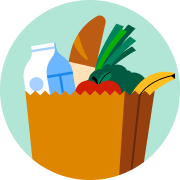
Fast delivery
Get in as fast as 1 hour

It’s all local
Shop your favorites

Direct chat
Connect with shoppers
Sugar Free Fresh Fruits for Delivery or Pickup
FAQs about fresh fruit
Nearly all fruits retain their freshness best when stored in the fridge. However, some unripe fruits should sit on the counter until ripe, at which point you can move them to the fridge. Fruits that can sit out to ripen include bananas, peaches, plums, papaya, mangoes, melons, nectarines, guava, apricots, and avocados.
Store fruit in the crisper drawer of your fridge. Use packaging that has small holes to release moisture. This will help your fruit last longer. If you have more fruit than you can eat before it goes bad, you can store it in the freezer for up to a year.
Each fruit has a different shelf life. Raspberries and strawberries may only last around 3 days. Ripe peaches, pears, grapes, kiwis, mangoes, and avocados are usually good for about 5 days. Blueberries and gooseberries may last for a week or more. Grapefruits and oranges are usually good for 2-3 weeks, and apples can last 3-4 weeks.
You can usually tell if your fruit has gone bad with a visual inspection. Signs that a fruit is no longer good to eat include:
- Grainy texture.
- Mushy to the touch.
- Foul odor.
- Wrinkly skin.
- Extreme discoloration.
- Skin that's peeling away.
- Visible mold.
Always wash fresh fruit before eating it. You can do so easily by gently scrubbing it under cold running water for at least 30 seconds. Gently pat the fruit dry with a clean towel or paper towel. Cut away damaged or bruised areas before you eat the fruit.
Always keep fruit away from raw meat, poultry, or seafood when you're preparing food to avoid contamination. Refrigerate cut fruit or cooked fruit within two hours, or within one hour if the temperatures are 90°F or above.
You can consume many fresh fruits whole with the peel, and simply eat around the pit, seeds, or core. Avocado and honeydew melon peels are inedible. The peels of pineapples, bananas, and melons are edible, but generally too tough to chew comfortably.
The daily recommended intake of fruit varies by individual. According to the U.S. Department of Agriculture, general daily guidelines are:
- Children 2-3 years old: 1 cup.
- Children 4-8 years: 1 to 1 1/2 cups.
- Children 9-13 years: 1 1/2 cups.
- Girls 14-18 years: 1 1/2 cups.
- Boys 14-18 years: 2 cups.
- Women 19-30 years: 2 cups.
- Women 31 and over: 1 1/2 cups.
- Men 19 and over: 2 cups.
One cup of fresh fruit is also equal to 1 cup of 100% fruit juice or 1/2 cup of dried fruit. Eating whole fruits can give you a healthy source of fiber, antioxidants, and other nutrients. Fruits have no cholesterol and are generally low in sodium, calories, and fat. While fruits do contain sugar, their natural sugars are better for you than added sugars.
When a fruit is in season, it generally delivers better flavor and nutrition. Local fruits that are in season won't travel as far or as long to get to your plate. Seasonal fruits are often more affordable and more abundant. Fruits that are sold out of season are often grown in greenhouses or shipped from distant locales. In-season fruits will vary depending on where you live. It's best to research the growing seasons in your particular part of the country to better understand what's seasonal for you.
You can purchase a wide variety of fresh fruits through Instacart. Leave a note for your Instacart shopper in the order with specifics such as your preferred size or ripeness to make sure you get exactly what you're looking for. Save time while still enjoying fresh produce with the convenience of Instacart. Place your order for same-day delivery now!















































